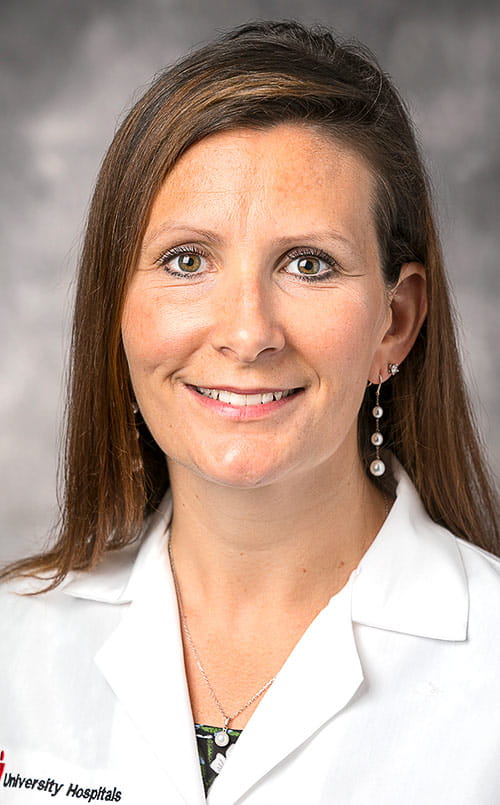Excellence in Minimally Invasive Colorectal Surgery
January 18, 2022
Meagan Costedio, MD, recently recognized with a “Dinner with the Doc” honor, is a leader in surgical innovation at UH Ahuja
UH Clinical Update | January 2022
Protocols designed to enhance recovery after surgery (ERAS), along with wider adoption of minimally invasive approaches, are significantly changing how many patients experience surgery. Pre-operative counseling, nutrition and medications set the stage for surgical success, coupled with innovative approaches to managing pain and the patient getting up and walking as soon as possible to aid with recovery. What was once a multi-day hospital stay for most is now often just a day or two for many.
 Meagan Costedio, MD
Meagan Costedio, MDMeagan Costedio, MD, a colorectal surgeon at University Hospitals, embodies this approach. She does nearly all of her colorectal procedures minimally invasively and is a leading voice in promoting ERAS protocols for all surgeries from her vantage point as Chair of the Department of Surgery and Surgical Specialties and Medical Director of Colorectal Surgery at UH Ahuja Medical Center.
My team and I are very invested and work hard to enforce enhanced recovery protocols after surgery,” she says. “I’ve got to say, they do work, the patients go home and usually do well. We’re prescribing minimal doses of narcotics after surgery, and a lot of patients are saying they didn’t use anything after they went home. We also do numbing medication blocks at the time of surgery laparoscopically. All of those things together – not using narcotics, ambulation early and often, not having a catheter in -- it’s made a huge, huge difference in the past few years.”
And the numbers don’t lie. Under Dr. Costedio’s leadership at UH Ahuja, colorectal surgery has one of the lowest length of stay in the UH system (3.6), below the national average for readmissions (11%), and successful reduction of Foley catheter use from 69% in 2019 to 28% at year’s end in 2020. Patients have taken note of Dr. Costedio, as well, with 93 percent giving her the top grade in patient experience surveys for doctor communication.
Dr. Costedio was recently recognized by UH CEO Cliff Megerian, MD, for this exemplary record with a “Dinner with the Doc” honor. She joined UH four years ago from Cleveland Clinic, impressed with UH’s emphasis on putting the patient first.
“I feel that UH appreciates and wants us, the physicians, to do that and wants the patients to have a good experience,” she says.
Dr. Costedio says she values the data transparency present at UH, and the breadth of expertise among the colleagues she can refer to for procedures she may not perform as often. She, in turn, takes referrals for colorectal surgeries that are best done using her minimally invasive expertise.
“The transparency and the data here is a wonderful thing,” she says. “I know it’s benefiting the patients. I don’t do hernias very often, which means that I’m slower at it, so I refer those patients to the surgeons who do them all the time. I know that it’s the right thing for the patient. The data transparency is wonderful – I know who is high volume and high value and can get patients to the right surgeons for the diagnosis.”
In her surgical leadership role at UH Ahuja, Dr. Costedio has also been tested by the COVID-19 pandemic – as everyone at UH has been. Her particular challenge has been how to manage patient flow when inpatient surgeries were limited to 10 per day. Dr. Costedio helped identify surgeons who could convert some of their inpatient or 24-hour observation procedures to outpatient procedures and helped juggle surgeon schedules to ensure adequate coverage.
“We have a great problem at Ahuja where surgeons want to work, we just didn’t have the inpatient beds to support the surgical volume,” she says. “It was kind of like a Tetris game to get some surgeons from Tuesdays to Thursdays because it meant totally disrupting schedules, but we all worked hard at trying to identify the surgeons where we could find a switch. Then it was a matter of going through the daily cases if we had more than 10 and figuring out the most acute and going from there. The good news at UH Ahuja is that we did not hit that critical crunch of patients. We managed to avoid some critical, difficult situations because of this pre-emptive management. The team worked hard behind the scenes.”
Through it all, Dr. Costedio says it’s her connection to her patients that sustains her as a surgeon. She is known among the UH Ahuja nurses for spending as much time with her patients as needed, whether that’s 45 minutes discussing ways to prevent rectal prolapse from recurring, or crying with a patient over their cancer diagnosis.
“We try to support them and their family – get them to the resources that they need,” she says. “We spend a lot of time in the counseling phase, saying it’s OK to cry and to mourn and to grieve, but we also need to address the cancer. It’s really a more holistic approach with people, and I think they appreciate that. When people feel comfortable, it helps them overall, and makes them more likely to follow through with the care they need.”
Congratulations to Dr. Costedio on her “Dinner with the Doc” honor.


